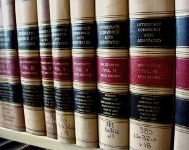Supreme Court Candidates Debate: Testy Talk About Collegiality
Four thoughts in the aftermath of the debate Monday evening at Eckstein Hall between incumbent Wisconsin Supreme Court Justice David Prosser and his challenger in the April 5 election, Assistant Attorney General JoAnne Kloppenburg:
First: As a news reporter, I’ve never covered a race for a Supreme Court seat. I was struck by how awkward the debate is, compared to the plain old partisan races I’ve covered fairly often. It’s similar to confirmation hearings for U.S. Supreme Court justices: Basically, if you have something substantial to say, you can’t and shouldn’t say it. You can’t say what you would do with any potential upcoming issues. Frequently, you can’t (or won’t) comment on past actions, although Prosser did talk about some past cases and said he was glad to run on his record. So you end up standing there, saying repeatedly that you are independent and nonpartisan and will judge each case fairly and with an open mind. Which both Kloppenburg and Prosser did. But it is very clear that Prosser is being backed by conservatives and Republican-oriented groups and Kloppenburg is being backed by liberals and Democratic-leaning groups. Do all these people and groups know something the candidates don’t know? Are they wrong? Or is this a curious exercise in avoiding talking about the issues, even though everyone seems to know what you’d say if you did?
Two: I’ve been at some testy and tense debates and joint appearances by candidates in various races, but this one was way up the list, if it wasn’t the champion on my personal list.


